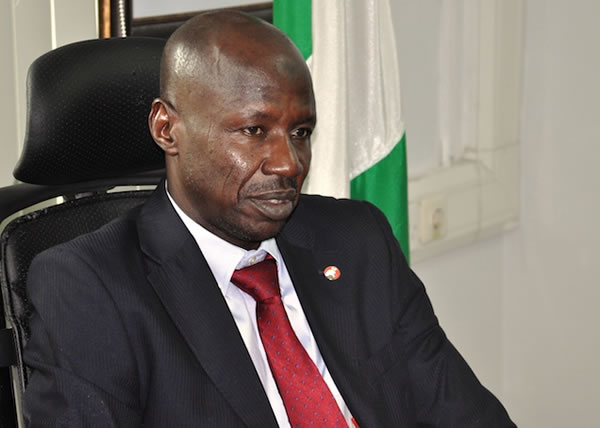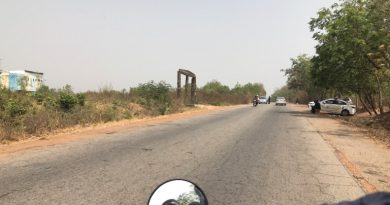Magu’s case: Nigeria is fighting graft with corrupt institutions
Nigeria has an acute corruption problem. But it is not just individual corruption; it’s also systemic and institutional corruption. A country that has the problem of endemic corruption but lacks robust institutional arrangements to tackle it is doomed unless it radically transforms itself. That, sadly, is Nigeria’s state of affairs!
To be sure, no country is inherently immune to corruption. What makes the difference between a fantastically corrupt country and the least corrupt one is the incentive structure embedded in their anti-corruption institutions and the integrity of those running those institutions. Thus, as the United Nations Development Programme, UNDP, rightly says, “Corruption is a failure of institutions, in particular, those in charge of investigation, prosecution and enforcement.”
Unfortunately, that institutional failure is extremely acute in Nigeria. There is no credible national integrity system. Look around, you will not see what sociologists call “pillars of integrity”, credible institutions that can act as powerful countervailing forces against corruption. Rather, corruption infests every state and social institution in Nigeria, and flows directly from the top. In Nigeria, the fish rots from the head down!
Over the past few years, the heads of Nigeria’s legislature, judiciary, police and intelligence service have been accused and charged with corruption offences. In fact, in 2005, a former inspector general of police, Tafa Balogun, was jailed for corrupt practices!
The latest evidence of top-down corruption in Nigeria is the recent suspension, arrest and investigation of Ibrahim Magu, the acting head of Nigeria’s most famous anti-graft body, the Economic and Financial Crimes Commission, EFFC, on various allegations of corruption. Surely, if the head of a country’s anti-corruption agency could be accused of corruption, which damages the institutional integrity of the organisation and undermines public trust in it, you don’t need further evidence that the country is losing the battle against corruption!
Yet, the presidency thinks differently. It puts a spin on Magu’s arrest and detention, arguing that it shows Buhari is serious about his war against corruption. In a statement dripping with spin-doctor’s sophistry, Garba Shehu, President Buhari’s senior media assistant, said “there is no better indication that the fight against corruption is real and active”!
Well, there is a less generous interpretation. The arrest and detention of the head of Nigeria’s anti-graft body on corruption allegations shows that corruption is truly systemic and institutionalised in Nigeria, and that tackling it is tough. Surely, if a country can’t have irreproachable anti-graft bodies and officials, where is the hope that it can win any war on corruption? Can you fight corruption with corrupt institutions and leaders? Of course, not!
Sadly, rather than the Magu case vindicating Buhari’s war against corruption, it shows that the “war”, after five years, is unwinnable. President Buhari himself more or less admitted that in a recent statement. In a recent letter to the South African president Cyril Ramaphosa, current chairman of the African Union, President Buhari, writing as the AU’s Anti-Corruption Champion on the occasion of the “Africa Anti-Corruption Day” on July 11, said: “The massive corruption being perpetrated across our national governments has created a huge governance deficit”.
That’s true. But President Buhari failed to say two things in that letter. First, he should have admitted that Nigeria has given Africa the worst reputation on corruption. Second, he should have admitted his own failure. For, truth is, despite his undisputed personal integrity, Buhari has failed to exercise good judgement in fighting corruption in Nigeria.
Truth is, Magu’s indictment by the DSS cast a shadow over his suitability as head of such a key anti-corruption body. But President Buhari has a tendency to stand by his favoured, if tainted, appointees until doing so becomes untenable
Think of it, Buhari said in 2015 when running for president that, if elected, “the corrupt will not be appointed into my administration.” Yet, some of the serious allegations of corruption over the past five years have been made against his political appointees, including a secretary to the government, who allegedly misappropriated funds for internally displaced people. Leadership is about exercising sound judgement in decision-making. Buhari hasn’t done so with some of his appointments.
Take Magu. Most of the allegations against him are not new. As long ago as 2016, the Department of State Service, DSS, indicted him on serious corruption allegations. The Senate rejected his nomination twice and passed a resolution calling for his removal as acting head of the EFCC. But in 2017, Vice President Yemi Osinbajo, then acting president, said: “Magu will be EFCC chairman as long as Buhari and I remain in office.” Talk of giving a hostage to fortune. So, what changed?
Truth is, Magu’s indictment by the DSS cast a shadow over his suitability as head of such a key anti-corruption body. But President Buhari has a tendency to stand by his favoured, if tainted, appointees until doing so becomes untenable. As it did with Magu! Which is why the presidency’s attempt to use Magu’s suspension to burnish Buhari’s anti-graft reputation stretches credulity! It was bad judgement to have kept him in that post despite the allegations swirling around him!
But the wider issue is institutional failure. The United Nations Convention Against Corruption, UNCAC, stipulates that “Each State Party shall ensure the existence of a body or bodies, as appropriate, which prevent corruption.” The African Union Convention on Preventing and Combating Corruption, AUCPCC, also requires member states to “establish, maintain and strengthen independent national anti-corruption agencies.”
Nigeria ticked these boxes. Under President Obasanjo, Nigeria created key anti-graft institutions: The Independent Corrupt Practices and other Related Offences Commission (ICPC), the Economic and Financial Crimes Commission (EFCC) and the Code of Conduct Bureau (CCB). So, why, despite the existence of these bodies, is Nigeria still a fantastically corrupt country? Why is corruption deeply systemic and institutionalised in Nigeria?
The answer is simple: the anti-corruption institutions were not created to succeed. They lack the essential ingredients for success. As the UNDP says in its report on institutional arrangements for combating corruption, “the creation of anti-corruption institutions is not a panacea to the scourge of corruption.” To succeed, they must have critical attributes.
First, anti-corruption agencies must be headed and manned by people with unimpeachable personal integrity. Second, they must enjoy operational independence, free from political or other external interference. Third, they must be well-resourced, both in terms of material resources and personnel, and have first-class investigatory and prosecutorial expertise. Fourth, they must be transparent and accountable, with appropriate scrutiny, especially from the media and civil society organisations. Fifth, there must be proper inter-agency coordination. Sixth, they must enjoy public confidence, trust and support.
Well, it’s obvious that Nigeria’s anti-corruption agencies utterly lack these attributes. For instance, the fact that all previous heads of the EFCC left office in controversial circumstances and that Ibrahim Magu has actually been accused of corruption show that Nigeria’s anti-corruption agencies suffer from the absence of personal and institutional integrity. What about independence? Well, although the anti-graft bodies are independent on paper, in reality, they are often accused of being used for political vendettas.
With respect to resources and expertise, everyone knows that the anti-graft agencies lack investigative and prosecutorial abilities, which is evident from the fact that they lost several cases on technicalities. And, of course, they lack transparency and accountability. To date, neither ICPC nor EFCC has published audited accounts! Then, the acute problem of inter-agency rivalry rather than coordination. Of course, all these inevitably erode public confidence, trust and support! No anti-graft agency can succeed in those circumstances.
So, the Magus case has simply exposed the truth: Nigeria is fighting corruption with corrupt and utterly deficient anti-graft institutions. No country can fight graft without a supreme audit system; none can combat corruption without a competent and incorruptible judiciary; and, certainly, none can tackle the scourge of corruption without ruthlessly efficient and irreproachable anti-graft bodies. But Nigeria has none of these institutional qualities!
Magu shows that Nigeria is fighting a losing battle on corruption! Only systemic reforms, radical restructuring, can change that!


